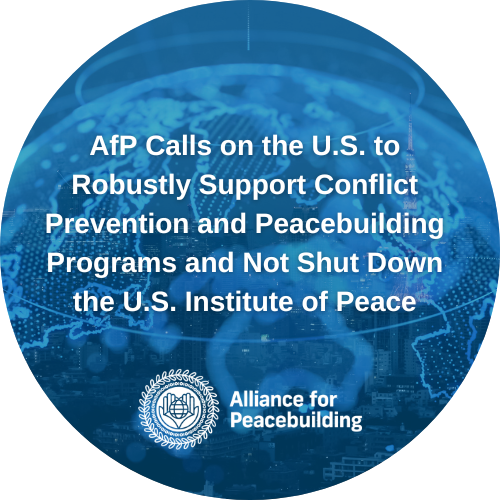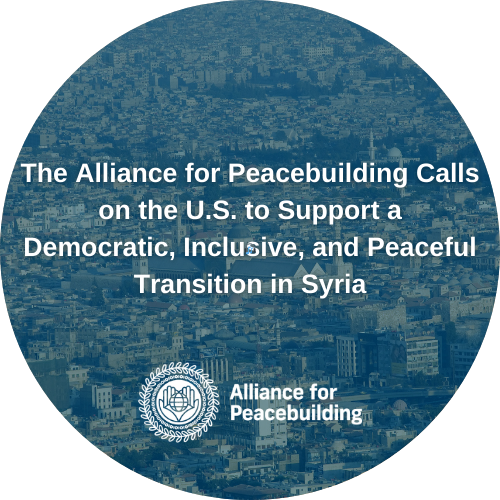The American University Conflict Mitigation and Peacebuilding Practicum team partnered with Alliance for Peacebuilding (AfP) to explore the challenges of measuring progress in the attainment of Sustainable Development Goal 16 (SDG 16) and potential lessons for the design of the 2030 Agenda for Sustainable Development.
Read MorePresident Bashar al-Assad's regime’s sudden defeat marked a surprising conclusion to the 13-year civil war in Syria. The incoming Trump Administration should undertake robust diplomacy at the highest levels to prevent further violence in Syria and the region, incentivize HTS and other potential spoilers to support a democratic transition, scale up conflict-sensitive humanitarian assistance, and deploy programs that prioritize stabilization, conflict and violent extremism prevention, and peacebuilding, in line with the principles of the Global Fragility Act (GFA).
Read MoreCentering peacebuilding and conflict prevention in U.S. foreign policy and assistance is not just the right thing for the incoming Trump Administration to do—it is the smart, strategically sound, and cost-effective thing to do. Every dollar invested in conflict prevention saves $16 that would otherwise be spent on expensive humanitarian or security responses. Peacebuilding’s inherent multisectoral, coordinated, and crosscutting approach results in more informed, evidence-based, and fit-for-purpose interventions that address the underlying drivers of violent conflict, violence, and insecurity. The previous Trump Administration made important strides by signing into law the Global Fragility Act (GFA) in 2019, along with other key laws that elevate conflict prevention and peacebuilding in U.S. foreign policy and assistance. By picking back up this mantle, the incoming Trump Administration has an opportunity to reduce and prevent violent conflict, violence, and fragility, stabilize rampant insecurity, and build sustainable peace at a time of record-breaking global conflict. However, to do so, the Trump Administration must ensure robust implementation of their laws and strategies, which requires changing the way the U.S. does business and prioritizing conflict prevention and peacebuilding. Such an approach can help the U.S. outmaneuver its geopolitical competitors, save American taxpayer money, and build a cadre of long-term allies and partners to advance U.S. interests and security globally.
Read MoreThe Prevention and Protection Working Group (PPWG) at the Alliance for Peacebuilding convened extensive consultations to compose the following assessment of and recommendations for the report to Congress of the U.S. Government’s (USG) atrocity anticipation, prevention, and response activities in 2023-2024, as required by Section 5 of the Elie Wiesel Genocide and Atrocities Prevention Act (EWGAPA). This assessment also addresses the implementation of the 2022 United States Strategy to Anticipate, Prevent, and Respond to Atrocities (SAPRA) and the use of the 2021 Atrocity Risk Assessment Framework (ARAF). The purpose of this assessment is to assist the USG in strengthening its reporting and improving the efficacy of anticipating, preventing, and responding to atrocities by identifying and analyzing trends, gaps, and opportunities to enhance measurement and demonstrate impact.
Read More







